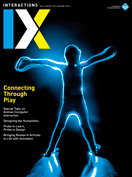Authors:
Sarah Fox, Daniela Rosner
It was the spring of 2014, and we were in the midst of a multi-sited ethnography of feminist hackerspaces in Seattle, Portland, and San Francisco. Community organizers had recently begun developing these spaces as collective workshops oriented toward different ways of knowing technology. Weaving circles sat alongside soldering stations; "imposter syndrome" workshops followed electronic-textile tutorials. This was not the same technology culture associated with male "hackers" and "geeks" in start-up lofts and garages. Members of feminist hackerspaces promoted systems of hacking oriented toward alternative legacies of technology development, including histories of women's labor. While our first several months of…
You must be a member of SIGCHI, a subscriber to ACM's Digital Library, or an interactions subscriber to read the full text of this article.
GET ACCESS
Join ACM SIGCHIIn addition to all of the professional benefits of being a SIGCHI member, members get full access to interactions online content and receive the print version of the magazine bimonthly.
Subscribe to the ACM Digital Library
Get access to all interactions content online and the entire archive of ACM publications dating back to 1954. (Please check with your institution to see if it already has a subscription.)
Subscribe to interactions
Get full access to interactions online content and receive the print version of the magazine bimonthly.






